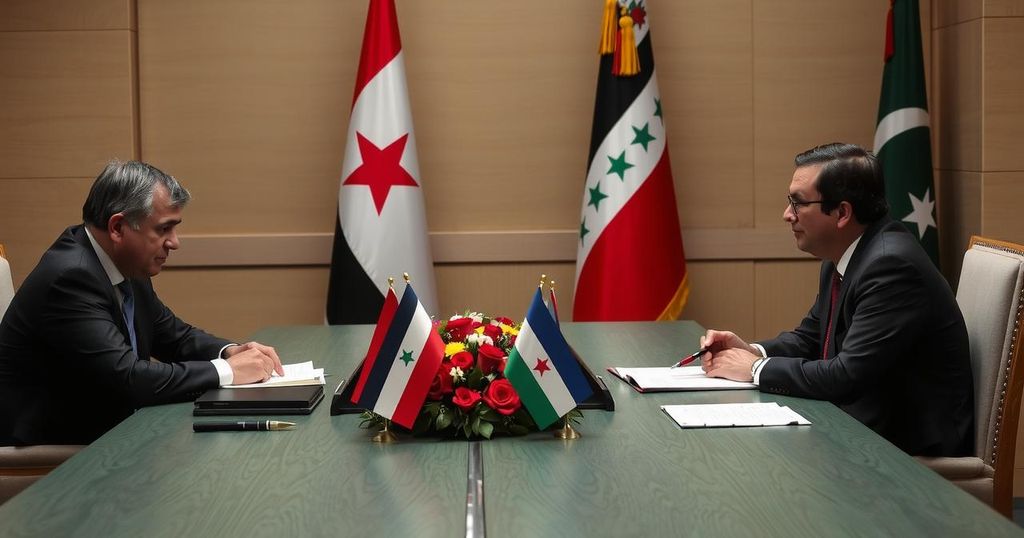Global Engagement Intensifies with Syria’s New Interim Government Post-Assad
Nations are intensifying diplomatic outreach to Syria’s interim rulers following the ousting of President Bashar al-Assad by Islamist-led rebels. As the new government emerges, concerns about HTS’s terrorist connections persist, prompting calls for accountability and support for the Syrian populace. Countries like Turkey, Qatar, Britain, and the United States are engaging with the new authorities, while challenges related to humanitarian needs and reconstruction remain pressing.
In the wake of Islamist-led rebels ousting President Bashar al-Assad, nations globally are increasing their diplomatic efforts to engage with Syria’s new interim authorities. This development follows the swift takeover of Damascus on December 8, which has sparked widespread celebration among Syrians, reflecting a newfound sense of liberation. Nevertheless, the rapid political shift has left many governments in a state of surprise, necessitating a reassessment of their foreign policy concerning Syria.
The group primarily responsible for this change, Hayat Tahrir Al Sham (HTS), remains contentious, with ties to Al-Qaeda and still classified as a terrorist entity by many Western nations. Diplomats such as UN envoy Geir Pedersen have advocated for a just and inclusive government, emphasizing the need for accountability regarding past atrocities. Concurrently, Qatar has resumed diplomatic operations in Syria, pledging strong support for the populace.
Turkey has also reestablished its embassy and expressed readiness to support the new Islamist-led government. Although Britain and the United States maintain that HTS is a terrorist organization, they have nonetheless initiated diplomatic communication, with Britain directly linking engagement to forthcoming humanitarian aid for Syrian citizens.
French representatives are set to reach Damascus to establish contact with the new ruling bodies while assessing urgent humanitarian needs. In parallel, Ukraine has coordinated efforts to deliver essential aid supplies. Following over a decade of brutal civil conflict with estimated casualties exceeding 500,000, the country faces significant challenges ahead, particularly regarding reconstruction and societal healing.
Initial signs of recovery are visible, as children return to school in Damascus for the first time since Assad’s exit. However, the interim authorities acknowledge the severe infrastructural damage and the pressing need for cohesive national rebuilding efforts. UN officials have called for an expedited humanitarian response from the international community. Amid concerns about the treatment of ethnic and religious minorities, many Christians report a sense of security under the new regime.
On the international front, countries such as Russia are reevaluating their positions, with reports indicating a reduction of diplomatic personnel in Syria. As conflicts in the region continue to evolve, assertions regarding military operations from Israel illustrate the ongoing volatility. The international response to these developments will be crucial for establishing a new path for Syria as it navigates its post-Assad reality.
Since the emergence of the Syrian civil war in 2011, which resulted from a severe crackdown on anti-government protests by Bashar al-Assad, the conflict has escalated into a prolonged struggle, claiming over 500,000 lives and displacing millions. The recent ousting of Assad, primarily initiated by Islamist groups, marks a turning point that could redefine both the internal dynamics of Syria and its relations with foreign governments. Central to this situation is the role of HTS, which has ties to extremist factions and problematic affiliations that raise concerns for future governance and stability in the region.
The ousting of Bashar al-Assad has set in motion a series of significant diplomatic maneuvers as nations realign their policies toward Syria’s new leadership. While some parties express optimism regarding a fresh start post-Assad, the complexities posed by HTS’s emergence as a major player cannot be overlooked. The international community’s response will play a crucial role in shaping Syria’s future, addressing humanitarian needs, and fostering an inclusive government that upholds justice and stability.
Original Source: jordantimes.com




Post Comment